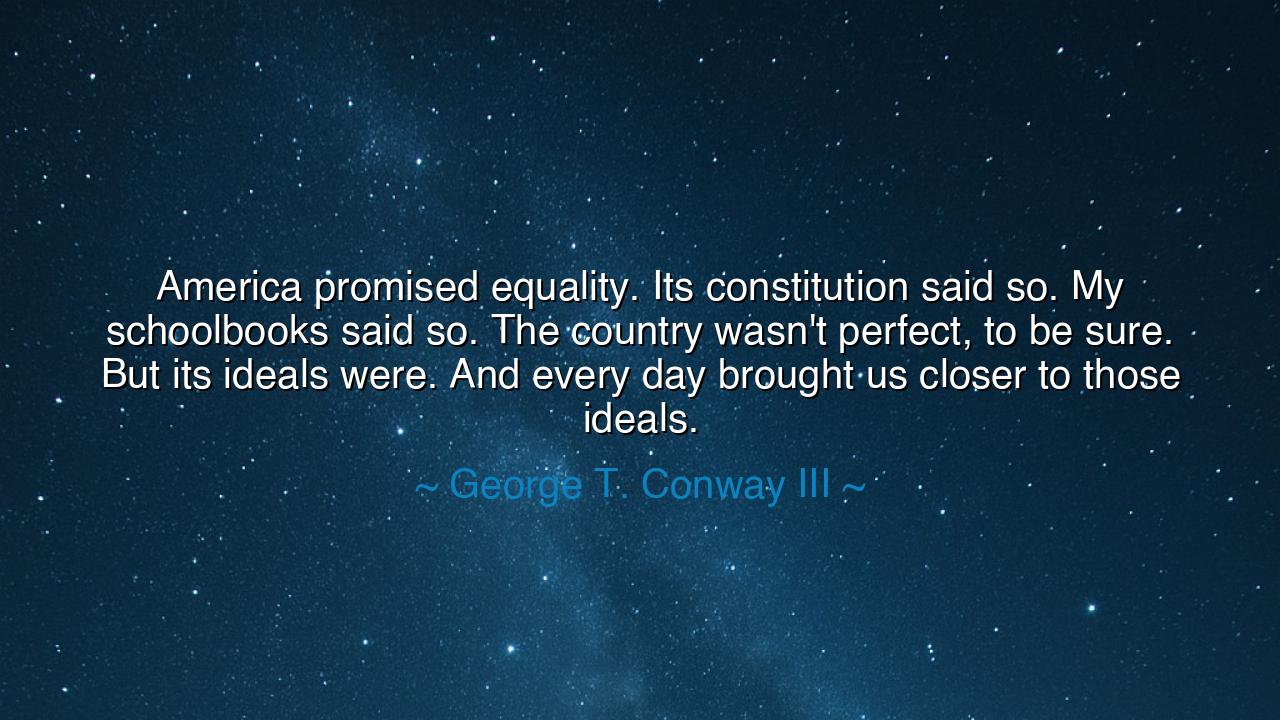
America promised equality. Its constitution said so. My
America promised equality. Its constitution said so. My schoolbooks said so. The country wasn't perfect, to be sure. But its ideals were. And every day brought us closer to those ideals.






In the grand narrative of human history, the promise of equality has been the most radiant beacon guiding nations toward justice. George T. Conway III captures this powerful sentiment when he says, “America promised equality. Its constitution said so. My schoolbooks said so. The country wasn't perfect, to be sure. But its ideals were. And every day brought us closer to those ideals.” These words are not just a reflection on the founding principles of America; they are a testament to the ideals that have shaped generations and continue to shape the future. Equality, as an ideal, was planted in the roots of America’s founding, and though the path to realizing it has been fraught with struggle, the pursuit of these ideals remains a driving force in the nation's ongoing story.
The ancients understood the importance of ideals as guiding principles. In ancient Greece, Socrates famously said, "The unexamined life is not worth living." He believed that virtue, justice, and equality were not merely abstract concepts, but lived ideals that must be actively pursued. Like the Greek philosophers, the founders of America set forth their vision of a nation built on the principle of equality, though, much like the ancient philosophers, the reality often fell short of the ideal. They knew, however, that the dream of a just society must be nurtured and worked toward with each passing day.
In the foundation of America, the Constitution itself became the sacred document that declared equality as a cornerstone of the nation’s identity. Yet, the story of American history is one of unfinished business, where the ideals of liberty and justice have had to be continually expanded to include all people. Slavery, segregation, and gender inequality were stains upon the nation’s fabric, but the ideals of the Constitution—that all men are created equal—remained a clarion call to which every oppressed group could appeal. It is as if the Constitution laid the foundation for a building that would never be finished in a single generation, but that would require the efforts of many to complete.
The story of Abraham Lincoln and his leadership during the Civil War illustrates this struggle. In his Gettysburg Address, Lincoln reaffirmed the nation's commitment to equality and freedom, even as it was mired in a conflict that sought to preserve the institution of slavery. His words echoed the ideals embedded in the Constitution, calling the nation back to its original vision of liberty and justice. He understood that the promise of equality was more than a political idea—it was a moral commitment that needed to be actualized through the sacrifices of countless lives. In the same way, George T. Conway III acknowledges that while America’s practical reality may not have always lived up to its ideals, the ideals themselves have endured, pushing the country toward a more just future.
In the modern context, we see that the struggle for equality is not simply a matter of law or politics, but of moral conviction. The Civil Rights Movement of the 1960s, led by figures like Martin Luther King Jr., was a bold declaration that America must fulfill its promise of equality. King’s words, spoken on the steps of the Lincoln Memorial, echoed the same ideals that Lincoln had championed a century before. “I have a dream,” he said, that one day all men would be judged by the content of their character, not the color of their skin. King’s vision was not just about equality under the law, but about the moral imperative to live out those principles in daily life.
Conway's reflection serves as a reminder to all who would call themselves citizens of any nation: ideals must be more than just words on paper. Equality, justice, and liberty are not concepts that can be merely proclaimed—they must be lived, pursued, and continually fought for. The lessons of the ancients remind us that ideals are not static, but dynamic—they require active participation and unyielding commitment. Each generation must carry the torch forward, as Lincoln and King did, constantly striving to bring the nation closer to its highest ideals.
The lesson we take from George T. Conway III is this: the journey toward equality is never easy, and the realization of justice is always a work in progress. We must never be complacent with the distance between the ideals we proclaim and the reality of the world we live in. Instead, we must be willing to act, to push forward, and to build a world that more fully reflects the highest values of equality and justice. Every day is an opportunity to move closer to those ideals, to shape a future where the promise of equality is not just a hope, but a lived truth for all. In doing so, we honor the legacy of those who have come before us and pave the way for future generations to inherit a world where the ideals of the past are finally fulfilled.






AAdministratorAdministrator
Welcome, honored guests. Please leave a comment, we will respond soon